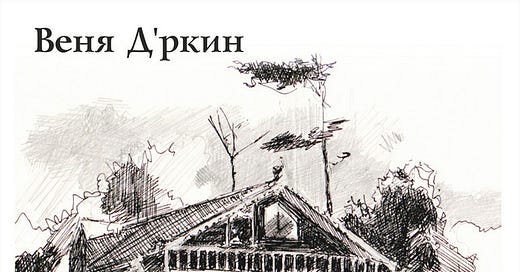Genre of the Day - Avtorskaya pesnya
Translates to “Author music” in Russian (Author music)
Album of the Day - Крышкин дом (Kryshkin's House) by Вениамин Д'ркин (Venya D'rkin) (2001)
June 6, 2024
It may be an unhinged thing to say, but perhaps it wasn’t too hard for Shakespeare to have earned the title The Bard, mostly due to the fact that he was from England in the 1500s. If he was born in Russia in the 20th century, he might’ve not been much more than a sardine in a sea of thousands of bards. Try becoming THE bard there!
Russia’s rich literary and poetic history is often underappreciated in the west besides a few key names, but the country is profoundly infused with the rhythm of words, as represented by today’s genre. The titanic social and political shifts in 20th-century Russia-turned-USSR left a culture in a constant state of convulsion and unrest. Musically, what could fit within the prescribed Soviet norms of expression of a Soviet ideology? What could cross those lines? What sentiments did singers need to voice power to during the 1960s onset of the Era of Stagnation, which fortunately coincided with something of a censorship thaw allowing more folk art to blossom?
Luckily for the new crop of culturally frustrated bards popping up, they had hundreds of years of written and folkloric Russian history to draw from in interpreting their own brave—or fearful—new age. Russia is a land of vast landscapes inspiring myriad fairytales. While fairytales have a childish or female connotation in the west, the dissemination of Russian fairytales functioned quite differently. Men were typically the ones to share the tales, and often without kids around for fear that the stories were too frightening. Russian fairytales were the language of the people in a serfdom-heavy societal structure for hundreds of years, but even as society industrialized their magical narrative power lingered. A deep passion for storytelling is a simple force that helped drive the Golden Age of high literature in Russia’s 19th century even in light of the works’ inscrutable complexities.
Given these narrative instincts, bard singers took on an omnibus songwriting scope. Avtorskaya pesnya simply translates to author music, and they authored songs about virtually anything. You could find the bards in the fields, mountains, and rivers in the form of “tourist songs” that exalted the social connections and mutual trust engendered by camping trips to the countryside, an exercise in social escapism from the brutalist Soviet city life. Outlaw songs, often written by those who had actually managed to leave gulag ordeals, also thrived in conjunction with protest-skewed songs that like yesterday’s Turkish protest genre attracted the attention of state forces. Browsing the life stories of many of the top-rated bards if you ask RYMheads (are they to be trusted?), you’ll find that many of these bards were both simultaneously prolific and wrote prolific catalogs of songs despite many living tragically short lives. In addition to tourist tunes, protest thumpers, and Siberian jailhouse blues, bards also covered the minutiae of daily life and one’s hometown as well as the harrowing experience of war.
Bard singing would largely find a home as the lyrical wellspring of rock bands in the ‘80s rather than among individual singers as the genre evolved from the ‘60s, but still many solo-flying bards marched on with their lonesome guitars. Though accomplishing three hundred songs written prior to his death of cancer shy of his 30th birthday, the loss of Venya D'rkin’s noble continuation of decades of bard music in 1999 remains tragic. Across this set, his works are as melodically engaging as they are lyrically rich (while this is another unfortunate instance where Google Translate can only convey so much, I do recommend browsing through the metaphor and allegory-rich lyrics). Not only is the tricky guitar work of songs like “Непохожая на сны” immensely absorbing, he advances the role of the lyricist more than many other bards in the dynamism of his vocals. The exasperation in his vocal hurls of the gloomy “Рябина за окном” (“Rowan Outside the Window”) and his birdlike lilt in materialism-critique “Песенка маленького гоблина” (“Little Goblin’s Song”) paint vibrant colors, enriching his prose with even more dimension.
I’ve heard a lot by this point and still felt that it’s one of the most striking, resonant albums I’ve heard on this column. It helped me realize just how much American and Russian recent musical histories mirror each other. The folk music renaissance in the ‘60s was much more worldwide than I had known, manifesting in Dylan’s blues troubadour-ism here, nueva canción and chanson in Europe and Latin America, and folktale-evoking social criticisms and odes in the bards’ USSR. Though the homes of the Yanks and the Russians are still often discussed as two opposite cultural spheres, they’ve never been: to this day Russia and the US’ musical histories continue to intertwine from their embrace of American rap-derived oddities like drift phonk or our fascination with Soviet-gothic bops and their cheap imitators.





Haunting and beautiful. I wish I had facility with Russian to be able to fully appreciate this. But what a voice!